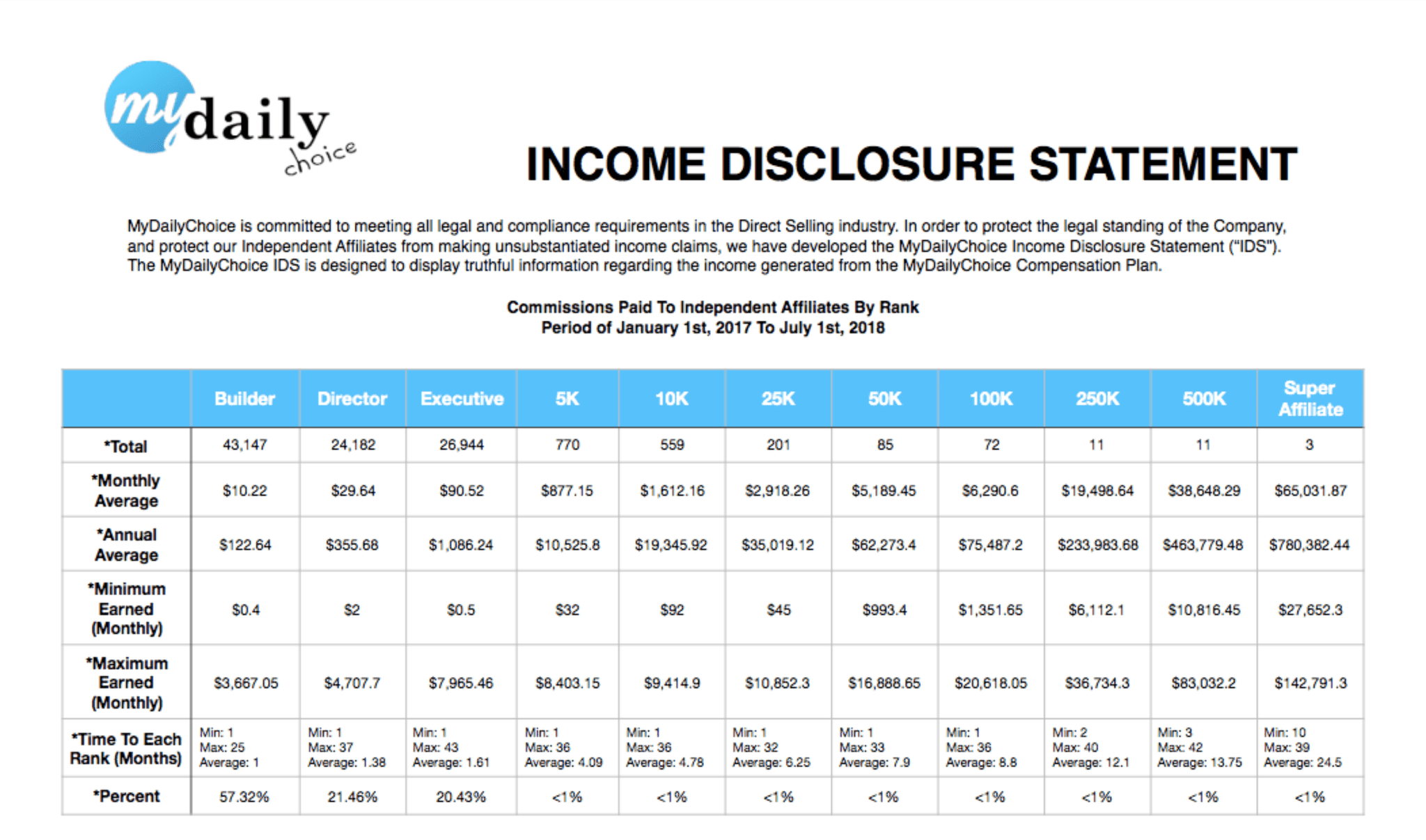Are Multilevel Marketing Companies Predatory Towards Moms?
Are Multilevel Marketing Companies a Total Scam? A Look at the Billion-Dollar Industry Targeting Moms

For women who stay home with their children or are just looking for a way to boost their family's income, multilevel marketing (MLM) — also known as referral selling or network marketing — seems like a sound way to make money without having to go to an office or find consistent childcare. On the surface, signing on to distribute products from these groups seems like a brilliant idea.
In fact, more than 20 million Americans have been involved with an MLM at one point or another. And why not? All you need is an active profile on social media and a little bit of hope. But for most women who get involved in these companies, the large paychecks and extravagant holidays offered by the likes of Herbalife, Young Living, and LuLaRoe are simply too good to be true.
When Marlie Ezarik, a mother and teacher from Texas, was first introduced to LuLaRoe — an MLM that sells women's clothing and leggings — she was eager to emulate the success that her sister, Jana, found selling for the company. But while Jana was one of the lucky few pulling in thousands of dollars each month, Marlie didn't have the same results. In fact, after investing the required $5,000 in the brand's starter kit and getting unlucky with a few expensive repairs upon buying a new home, Marlie found herself filing for bankruptcy.
"You become this pushy salesperson that nobody wants to become . . . You get to a point where you keep failing, and you're just stuck with all this inventory."
"It's all about how the company is sold to you," she told POPSUGAR. "It's not an easy, part-time job as it might appear to be. It's not just 20 hours per week — it's a significant job. You have to be able to devote the time. In my experience, you can't have another job while you're trying to sell LuLaRoe." Marlie soon felt herself sliding down a slippery slope she never intended to be on, particularly because of her limited control over inventory. "In LuLaRoe, you don't get to pick the prints you want," she explained. "Most people have at least 1,000 pieces of inventory. I would have these parties, and the people I invited would say, 'I've already seen this stuff,' and they were right. I just couldn't get rid of certain products. At that point, your supervisor will tell you to buy more inventory or go out and find more people to buy what you're selling. You become this pushy salesperson that nobody wants to become . . . You get to a point where you keep failing and you're just stuck with all this inventory."
Once she decided to quit, Marlie contacted the brand to get a refund for all of her leftover inventory, which was challenging. "I was able to actually get my money back from LuLaRoe. However, I have friends who have been waiting for more than two years for their refunds," she explained. "When I had to send all my inventory back, I went through about 20 rounds of emails with the company to confirm the styles and quantity of the inventory. I had to go back and forth with them until we finally agreed on an amount."
Depending on the company, selling products is simply one expectation. "MLMs are a type of business model that allows individuals to earn money in one of two ways. One is by selling products or services to others and making a retail profit," Bonnie Patten, the executive director of Truth in Advertising and a mom of three, told POPSUGAR. "The second way that they make money is by recruiting others to duplicate sales to others in order to form a team or 'downline,' and then they get profits from what their downline sells."
Although multilevel marketing has been an attractive option for moms for decades — think Tupperware, Mary Kay, Pampered Chef, and Avon — 73 percent of those involved either make no money or lose money, according to a study completed by the AARP in 2018. So it's easy to see why MLMs have such a questionable reputation. For women who have multiple mouths to feed or are on a limited income, signing up to take part in a MLM can potentially be a huge, costly mistake.
Do MLMs target mothers specifically?
Anyone with a Facebook account can be pitched products, but it's hard to deny the overwhelming number of mothers being targeted. Overall, 75 percent of those who work for MLMs are women, with moms making up a large part of that percentage, confirmed Patten. "Moms with newborn babies want nothing more than to be able to stay home with their child, not have to go back into the workforce, and simultaneously make some good money," she said, adding that: "And that's the way a lot of these MLMs are marketed — that you can make full-time pay working part-time hours."
Furthermore, many of the products sold by MLM companies are easily marketed toward moms, whether a person is promoting leggings, essential oils, all-natural cleaning products, or health shakes. Those who are involved in health-centric MLMs can be particularly aggressive toward mothers, especially if they just welcomed a baby.
"They advertise that you can stay at home with your kids and have your MLM business. New moms especially are so easy to prey on. It's terrible."
"MLMs prey on new mothers," said Claudia*, a mom who has been contacted by a number of MLM distributors over the years. "They write to me saying things like, 'Hey, you finally had a baby! It's time to get back into shape right now, drink this coffee, and take these all-natural pills, and you'll lose 20 pounds!' I felt targeted by multiple people during my immediate postpartum phase. I especially love when they ask how you're feeling and immediately go into their spiel about their magic potion that will cure postpartum depression and anxiety!"
Of course, there are some MLMs that rely on good, old-fashioned guilt. "Guilt in new moms is real, and guilt as a new mom returning to work is very real," said Jennifer Doll, another mom who was approached by various MLM representatives. "They advertise that you can stay at home with your kids and have your MLM business. New moms especially are so easy to prey on. It's terrible."
Claudia and Jennifer are not alone when it comes to the sheer number of pitches they get, both on social media and in person. Although many women are roped into these companies by promises of sisterhood and mentorship, many women find themselves ghosted if they decline to participate. "A lot of these women prey on your loneliness," shared Colleen Fremont, a woman with friends in MLMs. "Even if you don't sign up to sell, they'll guilt-trip you over you not being 'supportive' by throwing parties or letting them post on your wall to sucker your friends and family into spending money. When you say 'no,' they turn on you and can get very nasty. It's a very effective form of gaslighting."
How do mothers get involved in multilevel marketing?
Women can become involved in multilevel marketing companies in a number of ways. However, most moms get recruited by active distributors via social media. Tempted with foolproof marketing plans and less-than-accurate success stories by active MLM members, mothers often get roped into signing up or purchasing starter kits or products in the hopes of "starting their own business." Once they start selling, their upline — or the person who recruited them to join — takes a percentage of that seller's profits.
Tara*, a stay-at-home mom, was sceptical of MLMs at first. After losing her third pregnancy, she was approached by a friend who suggested becoming a LuLaRoe distributor. She jumped at the chance. "I was told so many stories of other moms in similar positions who made tens of thousands per month," Tara told POPSUGAR. "They made enough that their husbands had to quit their jobs to help them! On top of all of that, there was this sisterhood of 'mom bosses' that would help me, train me, lift me, encourage me, accept me, and become my best friends."
"I was an exhausted mom of three kids — one being a newborn — and was told to give up chunks of precious little sleep to try to sell just a few more pieces."
Desperate to contribute to her household's finances, Tara dove in despite some reservations she had about being "discouraged" by her superiors to voice concerns she had with the company. For the first two months of the operation, Tara had success. After spending $7,000 on inventory upfront and an additional $1,500-$2,000 in miscellaneous startup costs, Tara thought she was primed for success. She brought in $8,000 in sales over a six-week period — though only half that amount was profit — and then bought even more inventory per her upline's advice.
But when she discovered that she was expecting again and underwent a difficult pregnancy, the support system she thought she had disappeared from under her feet. "After the baby came, I struggled even harder," said Tara. "I reached up and asked my leadership for help. The advice I got? Something has to be sacrificed. Housework, time with kids, sleep. Pick one and sacrifice it in order to make the sale. I was an exhausted mom of three kids — one being a newborn — and was told to give up chunks of precious little sleep to try to sell just a few more pieces."
Tara knew it was the beginning of the end and eventually cancelled her contract, but the bad luck didn't stop there. Her attempt to have a clearance sale to sell off her remaining product was swiftly shutdown by her upline because it went against her contract. Now with more than 200 products sitting in her basement, Tara realised the error of her ways. "I lost a friend, managed to get myself into debt, and missed out on time with my kids," she explained. "I officially quit in October 2018 and I still have 200-ish pieces that I'll likely end up donating. I'm still paying down the debt I got myself into."
For this reason, Patten encourages those who are interested in joining a multilevel marketing company to take a good, hard look at their social circle before signing on. "The big money is not in selling the lipstick or the supplement to consumers," she explained. "The big money made by those at the top of the distributor ranks is always through recruitment and building enormous downlines that have over 100,000 people in them."
Do MLMs make false income claims?
There's no denying that MLM participants and companies have been dishonest in the past regarding their income claims. In fact, the problem is so prevalent throughout the industry that Federal Trade Commission (FTC) chairwoman Edith Ramirez encouraged MLMs to be more transparent at the Direct Selling Association's Business & Policy Conference in 2016.
"Multilevel marketers should stop presenting business opportunities as a way for individuals to quit their jobs, earn thousands of dollars a month, make career-level income, or get rich because in reality, very few participants are likely to do that," she said. "Although it may be true that a very small percentage of participants do have success of this type, testimonials from these rare individuals are likely to be misleading because participants generally do not realise similar incomes."
Stacie Bosley, a professor and economist at Hamline University, agrees that the promotional material of many MLMs don't line up with reality.
"The data from the companies themselves show that most people are making zero dollars in revenue, which means that they're making a negative profit once you factor in expenses," explained Stacie. "There's a small majority that's earning something on the order of minimum wage, and then there are some big winners. This troubles me because the numbers don't remotely match up to what companies are claiming in their marketing material and testimonials. Companies suggest that it's easy to be lucrative and it's all up to the seller to succeed."
False income claims are so pervasive in MLMs that the FTC has filed 27 class-action lawsuits against MLMs over the past 40 years alleging that certain companies were operating "illegal pyramid schemes." Since 2013, companies like Fortune Hi-Tech Marketing, Vemma, Herbalife, and Dluca have all been sued by the FTC. All of the cases have since been settled.
Although the phrase "pyramid scheme" is often thrown around in the same conversation as MLMs, Joe Mariano, the CEO of the Directing Selling Association (DSA) — a for-profit organisation responsible for "promoting, protecting, and policing" this industry — said there's a notable difference. "The issue with the pyramid scheme is where the compensation comes from," he said. "In a pyramid scheme, there's no real commerce going on, nobody is really using the product or if they are, it's a sham. The compensation is coming from the recruitment of other people into the plan . . . People are convinced to get involved on the promise of a get-rich-quick kind of approach."
However, according to the FTC, some of the telltale signs of pyramid schemes are in line with many MLM expectations:
- Being required to buy a large amount of inventory upfront
- Your pay is based mostly on the amount of people you recruit
- You're required to buy products and services you don't need to stay in good standing with the company
For many new MLM members, they are unaware of just how much product they need to purchase upfront before actually selling anything. While it might be easy to make a few sales in the beginning, often consultants are left with tons of products they can't sell, even at a discounted rate. All of the sudden, that "easy" paycheck is out of reach. They're not breaking even, let alone making an additional income.
"We couldn't just sit back and wait for complaints or issues to come to us."
Aside from following up on reports of false income claims, the DSA also launched a Direct Selling Self-Regulatory Council in partnership with Better Business Bureau (BBB) in January 2019. The purpose of the program is to articulate "clear principles, but primarily was initiated and took action based on consumer complaints." For the past two years, Mariano has made the council one of his top priorities. "We understood that there was a need for something, particularly in the areas of product and earnings claims, and that we couldn't just sit back and wait for complaints or issues to come to us," he explained. "We thought we had an obligation to fund that effort to make sure that the entire industry was credible."
For what it's worth, not all direct-selling companies have thus qualified to be DSA members. LuLaRoe and Monat — a popular beauty-based MLM — for example, are not part of the DSA. Although the organisation doesn't "specifically comment on findings" related to its review of applicants, Mariano outlined its membership policy:
During the [membership] process, companies are evaluated for their compliance with the DSA Code of Ethics in a variety of areas such as income representations, product claims, a company's compensation plan, adherence to the code's inventory repurchase and refund policies, salesforce training, and other business practices related to consumer protection. Companies – applicant and member alike – must address Code of Ethics complaints and inquiries logged with the code administrator, an outside third party who enforces the Code of Ethics. A pattern of complaints or a refusal to comply with a finding or remedy imposed by the code administrator can result in a delay or ineligibility for membership consideration.
For Mariano, upholding the standards laid out by the DSA is imperative. "Any individual company and certainly any one individual associated with this company could do something that ends up being a violation of the code, might run afoul of the law, somehow," he explained. "That's going to happen inevitably when you have as many people involved as we do, and in any business, not just direct selling. And that's why the code administrator has this very active role to address those individual problems and any systemic problems that might arise with companies."
While the DSA is trying to cover its ethical bases, some watchdog groups are sceptical of its effectiveness. "During our last last industry-wide investigations in 2016 and 2017, we looked at both false income and health claims," explained a spokesperson for Truth in Advertising who wished to remain anonymous. "In both cases, over 97 percent of companies making inappropriate income and health claims were DSA members."
Do MLMs make false health claims?
Among all the products being sold, sellers who work for health-based MLMs are far more prone to misleading potential buyers. Although workout and exercise plans like Beachbody offer nearly 100 at-home workouts, there's far more grey area when it comes to the promises made by products like diet supplements, shakes, and essential oils.
For moms with postpartum depression, anxiety, or a sick child, buying into these claims can be especially tempting. "When I was pregnant with my first child I had an Isagenix seller constantly talking about how I needed it to have an 'IsaBaby' and how the baby would be so much healthier and smarter if I drank her shakes," shared another mom named Jennifer Kern-Kaminsky. A mother of two named Chami Krueger has also had similar experiences: "One of my kids has OCD and the other one is type 1 diabetic, and I get approached often about this 'amazing' oil or supplement that will 'cure' my children."
According to Patten, the wellness community within the MLM world can be particularly dangerous for this reason. She said:
The wellness industry within the MLM community is by far the fastest growing and most popular sect. We did investigations into all of the DSA companies during 2016 and 2017 that were selling nutritional supplements and found that 97 percent were using illegal health claims. Many of these MLMs that are selling wellness products, essential oils, supplements, CBD-type products — you name it — are using illegal disease treatment claims. There are many testimonials by moms and dads talking about how it has helped their children, themselves, their grandparents, or whomever, and that's very compelling for a lot of women.
While the DSA says it's trying to improve the MLM industry as a whole, the group has rewarded companies with questionable track records in the past.
Truth in Advertising found that Jusuru — a health-based MLM — and its distributors have made "over 50 examples of unsubstantiated health and disease-treatment claims." Its sellers have claimed that the products "treat, cure, or alleviate" rheumatoid arthritis, osteoarthritis, neuropathy, cancer, psoriasis, diabetes, fibromyalgia, and sciatica. Furthermore, Truth in Advertising also "compiled over 40 examples of deceptive, atypical, and unsubstantiated income claims regarding the financial gains consumers will achieve by becoming distributors of Jusuru."
After receiving a warning letter from Truth in Advertising in June 2016 for using deceptive marketing strategies, Jusuru looked into these unethical practices and added an income disclaimer to its marketing materials shortly afterward. Despite being in violation of the DSA's code of ethics as well as state and federal laws, the DSA awarded Jusuru with a "Rising Star" award the very same year. Moreover in 2016, two additional nutrition companies — 4Life and Nerium — won awards for their respective marketing and sales campaigns although both parties were concurrently found to have made "unsubstantiated disease-treatment claims."
Can moms make money from MLMs?

Although it is possible for women to make money through multilevel marketing companies, the statistics aren't in their favour. My Daily Choice — an MLM company behind CBD products like HempWorx — released its income disclosure statement (pictured above), and the prospects of making real money are grim.
Overall, more than 41,000 people — roughly 57 percent of the company's distributors — reported earning $10.22 per month as "builders," or the lowest rung on the company ladder. Compare that to the three people at the "super affiliate" level, who net more than $65,000 per month from their downlines, and the writing is on the wall.
For Mariano, it boils down to expectations. "The vast majority of people are just going to make a few extra dollars," he explained. "It depends on what your measure of success is when one decides to get involved in a direct-selling enterprise. So you may be highly successful with your very limited goals when your goal was flexibility and to make that little extra income."
While making a little extra cash is certainly tempting, for most, it's just a pipe dream. "When you look at the limited data that's available about how many people are reaching the top ranks in these MLMs, consumers have a much higher chance of going bankrupt than ever reaching the top level," warned Patten. "When you take into account how much the products and services cost and someone's time and effort, no doubt the vast majority of distributors are losing money."
Ultimately, it's up to women to make their own financial choices. But fair warning: moms should do their due diligence before signing up for an MLM — otherwise it will most certainly cost them.
*Source's name has been changed to protect anonymity.







